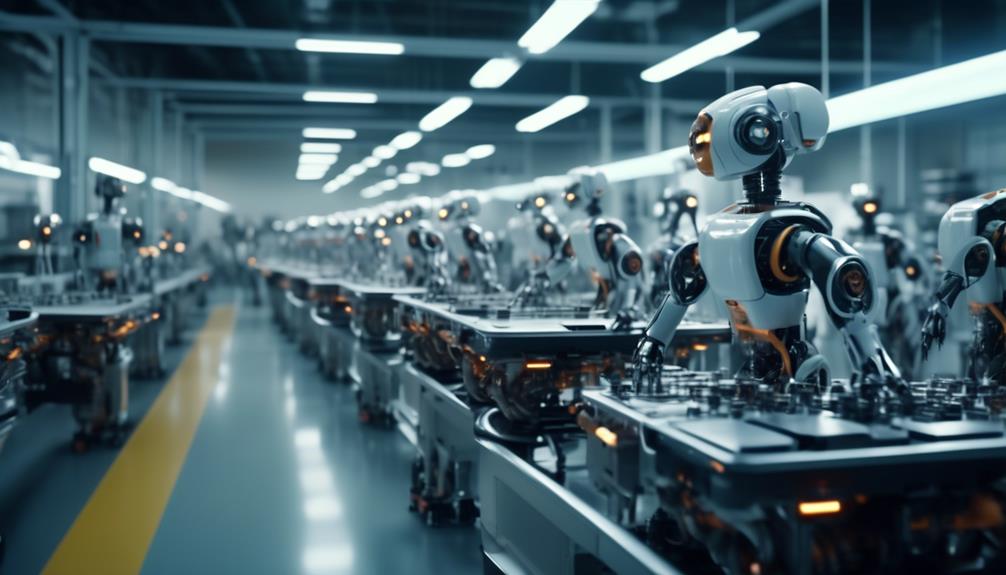Imagine a world where technology seamlessly intertwines with human capabilities, augmenting our abilities and propelling us into a future of endless possibilities. This is the realm that artificial intelligence (AI) is paving the way for in the tech industry.
From revolutionizing healthcare to transforming the job market, AI is reshaping the way we interact with technology and the world around us. But what exactly are the implications of this transformative force? How is AI reshaping the tech industry and what does it mean for us?
Prepare to be amazed as we uncover the profound impact AI is having on the tech landscape, unraveling the mysteries of this technological marvel and its potential to shape the future.
Key Takeaways
- AI automation and efficiency increase productivity and reduce human error, allowing businesses to handle higher workloads without increasing human resources.
- AI enables enhanced personalization by providing customized user experiences, tailored product recommendations, and targeted marketing efforts.
- AI improves data analysis by providing real-time insights, predictive analytics, and identifying inefficiencies and trends.
- AI plays a crucial role in cybersecurity by powering threat detection techniques, proactive defense strategies, and advanced cybersecurity measures.
Automation and Efficiency

Automation and efficiency are key factors driving the transformative power of AI in the tech industry. By harnessing the capabilities of AI, organizations are able to automate repetitive tasks and streamline processes, leading to increased productivity and numerous benefits.
One of the main advantages of automation is the reduction of human error. AI-powered systems can perform tasks with precision and accuracy, minimizing the risk of mistakes that can occur due to fatigue or oversight. This not only improves the quality of work but also saves time and resources that would otherwise be spent on rectifying errors.
Additionally, automation allows for faster and more efficient completion of tasks. Through AI algorithms, machines can analyze vast amounts of data in seconds, enabling organizations to make data-driven decisions and take prompt actions. This increased speed and efficiency not only saves time but also empowers employees to focus on more complex and strategic activities that require human creativity and problem-solving skills.
Moreover, automation brings scalability to businesses. With AI technology, organizations can scale their operations without the need for significant increases in human resources. As AI systems can handle large volumes of work, businesses can handle higher workloads, meet customer demands, and expand their operations without compromising quality or incurring excessive costs.
Enhanced Personalization
Now let's explore the concept of enhanced personalization in the context of AI transforming the tech industry.
With AI algorithms, companies can provide customized user experiences by analyzing vast amounts of data and understanding individual preferences. This enables tailored product recommendations based on user behavior, demographics, and past interactions.
Enhanced personalization not only improves the overall user experience but also increases customer satisfaction. By delivering personalized recommendations, companies can better meet the specific needs and preferences of their customers, leading to higher levels of customer engagement and loyalty.
In addition to product recommendations, AI-powered personalization can also be applied to other aspects of the user experience, such as content suggestions, customer support, and marketing campaigns. By understanding individual preferences and behaviors, companies can deliver relevant and timely content, provide personalized assistance, and target their marketing efforts more effectively.
Customized User Experiences
With the advancement of AI technology, tech companies can now provide highly tailored and personalized user experiences. This level of customization is made possible by leveraging AI algorithms that analyze user data and preferences.
Here's how AI is transforming customized user experiences:
- Personalized Marketing: AI enables companies to deliver targeted marketing campaigns based on individual user preferences and behaviors. By analyzing user data, AI can recommend products and services that are most relevant to each user, increasing the chances of conversion.
- User Centric Design: AI helps companies create user-centric designs by analyzing user feedback and behavior. By understanding user preferences and pain points, AI can optimize user interfaces, making it easier and more intuitive for users to interact with products and services.
- Dynamic Content: AI enables companies to dynamically generate personalized content for each user. By analyzing user data, AI can deliver content that's tailored to each user's interests, increasing engagement and satisfaction.
Tailored Product Recommendations
Tech companies are revolutionizing the way they provide personalized user experiences by leveraging AI algorithms to deliver tailored product recommendations. With the advancement of AI technology, personalized marketing and targeted advertising have become more effective and efficient than ever before.
AI algorithms analyze vast amounts of data, including user behavior, preferences, and purchase history, to create highly customized recommendations. These recommendations are based on patterns and trends that humans may not be able to identify on their own. By understanding individual preferences and needs, tech companies can offer products and services that are more relevant and appealing to each user.
This level of personalization not only improves the user experience but also increases customer satisfaction and drives sales. As AI continues to evolve, we can expect even more accurate and precise tailored product recommendations in the future.
Improved Data Analysis

Improved data analysis has revolutionized the way the tech industry understands and utilizes information. With the advancements in artificial intelligence (AI), businesses now have access to real-time insights and predictive analytics, enabling them to make data-driven decisions more efficiently.
Here are three ways improved data analysis is transforming the tech industry:
- Enhanced decision-making: AI-powered data analysis algorithms process vast amounts of data in real time, providing businesses with valuable insights to make informed decisions. This helps organizations identify trends, patterns, and anomalies that were previously hidden, enabling them to act swiftly and stay ahead of the competition.
- Personalized customer experiences: By analyzing customer data, AI algorithms can predict individual preferences and behaviors. This enables businesses to deliver personalized recommendations and offers, improving customer satisfaction and driving sales. With improved data analysis, companies can build stronger customer relationships and increase customer loyalty.
- Improved operational efficiency: AI-powered data analysis helps businesses optimize their operations by identifying inefficiencies and bottlenecks. By analyzing data in real time, organizations can gain valuable insights into their processes, enabling them to streamline operations, reduce costs, and improve overall efficiency.
Advanced Cybersecurity Measures
Now let's turn our attention to the crucial area of advanced cybersecurity measures.
With the increasing sophistication of cyber threats, it has become imperative for organizations to adopt enhanced threat detection techniques powered by AI. By leveraging machine learning algorithms, AI can analyze vast amounts of data in real-time, identifying patterns and anomalies that may indicate a potential security breach.
This enables proactive defense strategies to be implemented, minimizing the risk of cyber attacks and safeguarding sensitive information.
Enhanced Threat Detection
With advanced cybersecurity measures, organizations can enhance threat detection capabilities, effectively safeguarding their systems against potential cyber threats. Leveraging real-time monitoring and predictive analytics, AI-powered solutions can significantly improve the detection and response time to security incidents.
Here's how organizations can benefit from enhanced threat detection:
- Early threat identification: AI algorithms continuously analyze network traffic, log files, and user behavior patterns to identify potential threats in real-time. This proactive approach enables organizations to detect and mitigate threats before they cause significant damage.
- Anomaly detection: AI-powered systems can identify abnormal activities and behaviors that deviate from established patterns. By flagging these anomalies, organizations can quickly investigate and respond to potential threats, minimizing the risk of data breaches or system compromises.
- Predictive threat intelligence: AI algorithms can analyze vast amounts of data to identify patterns and trends associated with cyber threats. This enables organizations to anticipate and proactively defend against emerging threats, staying one step ahead of attackers.
Proactive Defense Strategies
To further strengthen your cybersecurity defenses, you can implement proactive defense strategies, employing advanced measures to anticipate and mitigate potential threats.
One of the key components of these strategies is real-time monitoring, which allows you to continuously monitor your systems and networks for any suspicious activities or anomalies. By leveraging real-time monitoring tools and technologies, you can quickly detect and respond to any security incidents before they escalate into major breaches.
Another important aspect is the use of predictive analytics, which uses historical data and machine learning algorithms to identify patterns and trends that could indicate potential cyber threats. By analyzing these patterns, you can proactively identify and address vulnerabilities in your systems, reducing the risk of successful attacks.
Implementing proactive defense strategies with real-time monitoring and predictive analytics can significantly enhance your organization's cybersecurity posture.
Smarter Virtual Assistants

Virtual assistants are becoming increasingly intelligent, revolutionizing the way individuals interact with technology. Thanks to advancements in natural language processing and machine learning, virtual assistants now possess a higher level of understanding and are capable of performing complex tasks.
Here are three ways in which smarter virtual assistants are reshaping the tech industry:
- Enhanced language comprehension: Virtual assistants can now understand and interpret natural language more accurately. They can discern context, identify user intent, and respond appropriately, making interactions feel more conversational and seamless.
- Personalized recommendations: Smarter virtual assistants leverage machine learning algorithms to analyze user data and provide personalized recommendations. Whether it's suggesting movies, music, or shopping items, these assistants can tailor their suggestions to individual preferences, enhancing the overall user experience.
- Task automation: With their increased intelligence, virtual assistants can now automate various tasks, saving users time and effort. From scheduling appointments and sending emails to managing smart home devices, these assistants can handle a wide range of tasks, allowing users to focus on more important activities.
As virtual assistants continue to evolve and become smarter, they're transforming the tech industry by enabling more efficient and personalized interactions with technology.
Revolutionizing Healthcare Technology
AI-powered technology is revolutionizing healthcare by improving patient care and streamlining medical processes. One area where AI is making a significant impact is in AI-powered diagnostics. With the ability to analyze vast amounts of medical data quickly and accurately, AI algorithms can assist healthcare professionals in diagnosing diseases and conditions more efficiently. By leveraging machine learning techniques, AI can identify patterns and trends in patient data, leading to faster and more accurate diagnoses.
Another way AI is revolutionizing healthcare is through telemedicine advancements. Telemedicine allows patients to receive medical consultations and treatment remotely, eliminating the need for in-person visits. AI-powered virtual assistants can facilitate these telemedicine consultations by gathering patient information, conducting preliminary assessments, and even providing initial diagnoses. This not only saves time and resources but also increases access to healthcare services for individuals in remote or underserved areas.
Furthermore, AI technology can also assist in monitoring and predicting patient health outcomes. By analyzing patient data in real-time, AI algorithms can identify potential health risks and provide personalized recommendations for preventive care. This proactive approach to healthcare can help in preventing diseases and complications, ultimately improving patient outcomes.
Transforming the Job Market

AI's transformative impact extends beyond healthcare, as it's reshaping the job market by introducing automation and enhancing productivity in various industries. The rapid advancements in AI technology have led to concerns about job displacement, as automation takes over tasks traditionally performed by humans. However, AI also creates new opportunities and demands for skill retraining.
Here are three ways AI is transforming the job market:
- Automation of repetitive tasks: AI-powered systems can now perform repetitive and mundane tasks with greater speed and accuracy. This frees up human workers to focus on more complex and creative aspects of their jobs. While some jobs may be replaced, new roles will emerge that require skills such as data analysis, programming, and problem-solving.
- Enhanced productivity: AI tools and platforms enable workers to be more productive by automating routine processes, providing real-time insights, and improving decision-making. This allows businesses to streamline operations, reduce costs, and deliver better products and services. As a result, companies are seeking employees who can effectively utilize AI technologies to drive innovation and efficiency.
- Skill retraining and upskilling: With the rise of AI, there's a growing need for workers to acquire new skills or enhance existing ones. As certain jobs become obsolete, individuals must adapt and learn new technologies to remain employable. Governments, educational institutions, and companies are investing in programs to retrain workers in areas such as AI programming, machine learning, and data analysis.
Frequently Asked Questions
How Does AI Contribute to Automation and Efficiency in the Tech Industry?
AI contributes to automation and efficiency in the tech industry by leveraging advanced algorithms and machine learning. It streamlines processes, reduces human involvement, and boosts productivity by handling repetitive tasks, analyzing data, and making intelligent decisions.
What Are Some Examples of Enhanced Personalization Through the Use of AI in the Tech Industry?
Enhanced personalization in the tech industry is achieved through AI-driven techniques. AI-powered recommendation systems analyze user behavior and preferences to deliver tailored content and experiences, improving user satisfaction and engagement.
How Does AI Improve Data Analysis in the Tech Industry?
AI improves data analysis in the tech industry by enhancing predictive modeling and facilitating improved decision making. It enables organizations to extract valuable insights from large datasets, optimize processes, and make data-driven strategic decisions.
What Are Some Advanced Cybersecurity Measures That AI Enables in the Tech Industry?
Advanced threat detection and AI-powered firewalls are some of the cybersecurity measures that AI enables in the tech industry. These technologies help protect against evolving threats and provide real-time monitoring and response capabilities.
How Do Smarter Virtual Assistants Utilize AI to Enhance User Experiences in the Tech Industry?
Smarter virtual assistants utilize AI to enhance user experiences in the tech industry. Through AI-driven user experiences, they offer personalized recommendations and contribute to AI-enhanced technology innovation, revolutionizing the way we interact with technology.
Conclusion
In conclusion, AI has revolutionized the tech industry, bringing automation and efficiency to various processes. With enhanced personalization, improved data analysis, and advanced cybersecurity measures, AI has become a crucial tool for businesses.
Smarter virtual assistants have made our lives easier, while healthcare technology has been transformed for the better.
As AI continues to evolve, it raises the question: what other industries will it revolutionize?

